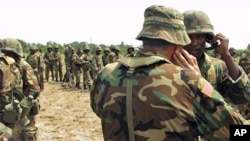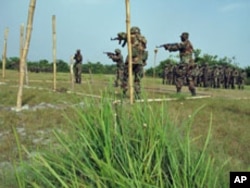As U.S. defense officials begin evaluating future sites for their Africa command, known as AFRICOM, a battle to host the command is brewing among U.S. states and territories.
At a recent hearing of the House Armed Services Committee, Georgia Congressman Hank Johnson sang Atlanta’s praise with hopes the city will become AFRICOM’s future host.
"We have got the world’s busiest airport," said Johnson. "We have quite a few military aviation facilities. We have got one of the country’s largest diaspora communities from Africa, superb infrastructure to support the military’s communication needs, [and] high quality of life for personnel who would be assigned to that area.
He said any location in his state of Georgia would be happy to serve as AFRICOM's base.
The U.S. Africa Command has operated out of Stuttgart, Germany, since it was activated in 2008. AFRICOM's field of responsibility was previously split between European, Central and Pacific Commands.
Initially, there were lots of discussions about whether AFRICOM would be based in Africa. Many African leaders and human rights activists spoke out against such a plan, however, saying excessive U.S. military operations on the continent would lead to more conflict rather than less. Only two African countries volunteered to host the command, Liberia and Morocco.
AFRICOM commander General Carter Ham, who assumed his duties in March, explained why so far AFRICOM has been based at Kelley Barracks in Stuttgart.
"The bulk of the resources were already in Stuttgart, the facilities were already in Stuttgart," said Ham. "So for purposes of getting the command off to an expeditious start that seemed to make a lot of sense."
Ham said Defense Secretary Robert Gates had asked him to start the process of determining what would be the best site for AFRICOM going ahead.
The commander listed some of the criteria he would be looking at. "Security, suitability, quality of life, transportation nodes, accessibility to the area of responsibility, a whole host of requirements that we would like to station our headquarters. And so that process has begun, and we will look at first of all to make sure that we have the methodology right”"
Ham did not give any more clues as to where AFRICOM might be based in the future, saying the process to determine this was only just beginning.
Another Congressman seeking AFRICOM for his state was Joe Wilson from the southeastern state of South Carolina and more specifically the city of Charleston.
He stressed the importance of cultural links. "I had the privilege of visiting Monrovia, Liberia and the great cultural association of West Africa to Charleston is very clear," said Wilson. "It is a shared culture. In fact, we have the same accents and I felt right at home."
Other representatives who bid for AFRICOM's future location included one from Minnesota, which is also a transportation hub, and a congresswoman from the island of Guam, which already is the home of an air force and a naval base. But both of these choices would seem to fall short of the criteria for quick accessibility to the area of responsibility, namely the African continent.
AFRICOM has been busy of late, as it took the lead in the early phases of current foreign military operations in Libya. Ham said its main objective remains helping combat any terrorist groups in Africa.
He said AFRICOM did not take part in recent operations in Ivory Coast because French and U.N. peacekeepers were already on the ground.
AFRICOM is responsible for U.S. military operations and military relations with 53 African countries, which includes north Africa, but not Egypt.





